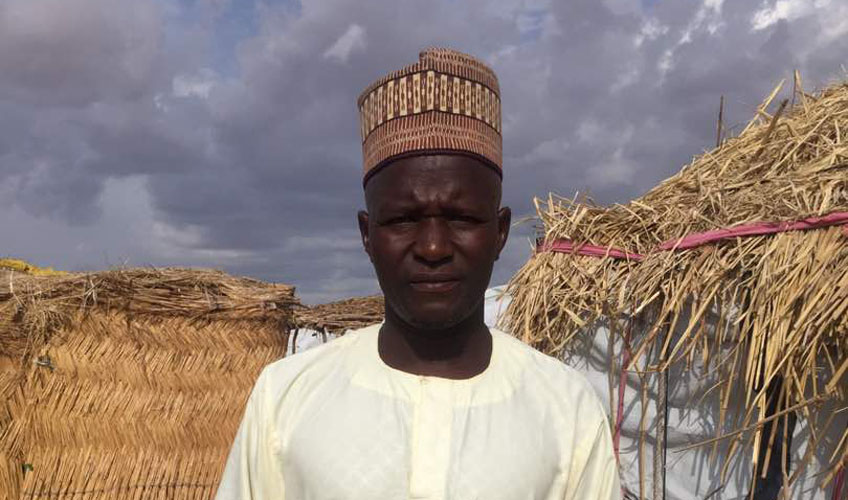Peace ambassador: Yusuf Issa’s story
“My name is Yusuf Issa. Before the crisis, I was a religious leader in my community. I led people in congregational prayer and actively participated in activities aimed at preaching peace.”

Yusuf Issa* currently lives in Muna Internally Displaced Persons (IDP) camp in northeast Nigeria, after fleeing his home because of the Boko Haram insurgency.
“Nine months after my arrival at the camp, and given my previous role as a community leader, I was chosen by International Alert Nigeria and their local partner Herwa Community Development Initiative to participate in peacebuilding activities and training.
“On the first day of the training, the trainer spoke about the need for peace and non-violent resolution of conflict. He put great emphasis on our interaction with women and girls who survived Boko Haram atrocities, as well as repentant Boko Haram members – and how that interaction could be improved.
During the session we also looked at how to actually manage conflicts between aggrieved community members in a non-violent way – by preaching forgiveness, especially towards people associated with Boko Haram. Since the trainings, I have dedicated my life to supporting women and girls returning from Boko Haram captivity in order to make their lives better. My goal is to create a community free of violence for all.”
I also hope to play my part in solving societal issues. I believe this is what we need to do to live peacefully – already there are a few noticeable progress towards peace and social cohesion in our camp – which I hope will last a lifetime, whether we stay here or go back to our homes.
Empathy for children born out of Boko Haram sexual violence
“Last year, Boko Haram survivors were isolated, highly stigmatised and their ability to move around freely was limited. Even their parents didn’t accepted them.
There was also a lot of discrimination against children born of Boko Haram sexual violence by people in this camp. It was hard convincing people to accept the children because of the cultural notion that the children had “bad blood” and would have the ideology of their fathers.
“However, after several dialogue sessions and workshops on reconciliation and reintegration, set up with the help of Alert, the situation in the camp changed. Things are still changing for the better. The project has helped people learn to love all children including those born of sexual violence by Boko Haram. People are bringing them closer and treating them with love.
I have come across cases where if a child of a survivor is involved in an accident, or if they are ill, other women in the camp visit their tent to show concern. They take food, water and drinks, depending on what they can afford, and regularly check on them to ensure they are getting better – something that would not have happened before. Today, community members are giving more love to children of Boko Haram sexual violence. These children are gradually gaining more confidence and learning to live normally like other children in the communities and IDP camps.”
Survivors are now a part of the community
“Stigmatisation of survivors used to be a big issue in the camp. Survivors were not allowed to partake in gatherings or weddings as people were scared they would hurt them. When a survivor was seen at an event, they were made to leave the area. This obviously made them depressed and caused them more pain and hurt. However, with the help of this project, more survivors are allowed to pay visits to different households and to attend events like weddings and naming ceremonies.”
It is also the case that survivors now sit among their peers, freely interact, and relate. It wasn’t like this before, and if I am to be honest, I never thought it would get to this stage.
“I feel joy when I see a survivor that used to isolate herself not doing so anymore. It shows me how positively the project has impacted the minds of people and I am glad to be here to see the result of something I thought was almost impossible.
“As a community leader, and from what I have learned from International Alert, my advice to other leaders in communities and IDP camps is that they should learn to understand that peacebuilding and non-violent conflict resolution are very important. We are seeing the impact of it. We now understand the importance of accepting all the returning women and girls, and even repentant former combatants coming back to the community. We know that if they are rejected, they become depressed and are likely to take wrong decisions.
“I hope international Alert stays here with us in the camp and I also want them to reach us when we return home in order to help more people back in our community.”
*All names have been changed to protect privacy
About the project
‘Supporting vulnerable communities and conflict-sensitive reintegration in northeast Nigeria’ was a project to help reintegrate survivors of sexual violence by Boko Haram as well as support people internally displaced by the conflict.
International Alert Nigeria worked in three camps for internally displaced people and one host community in Maiduguri, and another community in nearby Bama, to help those affected by the violence reintegrate back into society and move forward with their lives.
This included holding victim support and family dialogue sessions – especially women, girls and children, running public awareness campaigns on stigma reduction, and training local leaders on peacebuilding and non-violent conflict resolution.
Alert worked on this project with the following local partners: Federation of Muslim Women’s Associations in Nigeria (FOMWAN), Health Care Development Focus Initiative (HECADF), Herwa Community Development Initiative.






